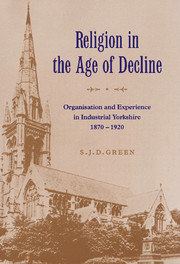Book contents
- Frontmatter
- Contents
- Acknowledgements
- List of tables
- List of abbreviations
- Introduction
- Part I Providing the means
- 1 The environment and its constraints: economic revolution, social transformation and spatial evolution
- 2 The many houses of God: churches, church building and church extension in the industrial town
- 3 The burden shared: the changing political economy of religious organisations
- Part II Drawing in the people
- Part III The trials of the religious life
- Conclusion
- Bibliography
- Index
3 - The burden shared: the changing political economy of religious organisations
from Part I - Providing the means
Published online by Cambridge University Press: 08 October 2009
- Frontmatter
- Contents
- Acknowledgements
- List of tables
- List of abbreviations
- Introduction
- Part I Providing the means
- 1 The environment and its constraints: economic revolution, social transformation and spatial evolution
- 2 The many houses of God: churches, church building and church extension in the industrial town
- 3 The burden shared: the changing political economy of religious organisations
- Part II Drawing in the people
- Part III The trials of the religious life
- Conclusion
- Bibliography
- Index
Summary
Introduction: the idea of a political economy of religious organizations
The very idea of a political economy of religious organisations smells of the worst kind of historical reductionism. For whatever else they were, late nineteenth- and early twentieth-century religious societies were not commercial enterprises in disguise. They did not produce, distribute and exchange sacred, or any other, goods and services in order to maximise private profit. This was because they sought no corporate gain for themselves and presumed no calculating motive on behalf of their customers. Similarly, they eschewed the precise calculation of needs and the exact planning of provision characteristic of the science of bureaucratic organisation, for they trusted that such needs had no bounds and believed that their own efforts should set no proper limits. Yet if so, the foul odour hides a fine fruit. This was because there was a recognisable political economy of religious organisations in later Victorian and Edwardian West Yorkshire. True, its churches and chapels had no commodities to exchange, or goods to distribute. But they did raise and spend money. They had to. The work of the Church and its witness to the Word demanded the survival, indeed the prosperity, of its institutions in the world. To survive, those institutions needed money. To thrive, they needed to use it wisely. How they raised it and how they spent it was of enormous significance for the changing forms, and for the contemporary health, of local religious life.
- Type
- Chapter
- Information
- Religion in the Age of DeclineOrganisation and Experience in Industrial Yorkshire, 1870–1920, pp. 130 - 178Publisher: Cambridge University PressPrint publication year: 1996



